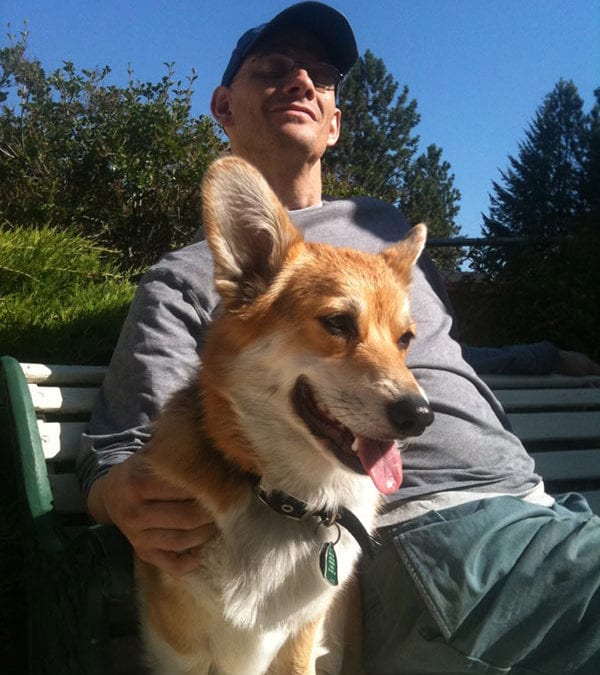My first dear Corgi, Vippy, was a yearling when I was diagnosed with Adrenomyloneuropathy in 1996. Walks with him were slow affairs. Partly because he was seriously sniffy and a bit of a garbage mouth. Partly because I was dragging myself in those early days of my illness. But Vip did not mind canes or crutches. He never showed fear or frustration. At the end of his glorious canine career, he made a similar journey through a series of mobility aids. Eventually he got wheels of his own. In his final months, I bought him a red Radio Flyer wagon so he could tour the neighborhood in style. We were quite a pair.
My days did not feel complete without a Corgi to fill them. I was bereft. Only a puppy can ease that kind of ache. In the search for a new companion, I did not think about how a puppy would react to a wheelchair. The heart wants what the heart wants. When I saw Gus, I set my heart on him. Loving Gus is easy. Gus is easily loved. He unconditionally accepts the entirety of me, wheelchair and warts and all.
At first, Gus began sitting by the wheelchair when I was not using it. Soon he was sleeping under it. He likes to stay close during the day, so he started resting when I was seated but stationary with his head between the larger back wheel and smaller front wheel. That kind of trust melts and makes me. With the help of a hands-free leash, we figured out how we could travel together, how we would cross busy streets, how we might negotiate boisterous crowds. We had one mishap as he started testing his strength, a surprise Gus lunge that flipped me.
Together we created rituals. When the weather is fine, I sit outside Caffe Umbria for my daily latte. Coffee this good requires time to savor. I transfer to one of their chairs, leaving my wheelchair empty. Gus then jumps into it, and we chat, he and I, more or less at eye level. When we are out and about, making our rounds, he eagerly approaches people who are using wheelchairs. He pulls to make contact. I have to explain his preference to strangers surprised by his automatic and eager affection.
Life in a chair can feel like a clumsy, frustrating affair. I look to Gus when I balk. “Let’s go,” he begs or barks. And we do. This is the way it is. That’s just fine with Gus. So that’s just fine with me.


The unconditional love from dog to man and in your case from man to dog is inspirational to all who are blessed to fall within your circle of life and love.
Thanks for giving me a clear reminder of some of the nuances of love and life.
You’ve played a pivotal role in the lives of many canines, Rick. So you know about the kind of love that surpasses understanding.
Another great one, Randy. Gus is a good boy, and he and Willie are pals. Now that I am alone, Willie and I talk more. He acknowledges me with a lick on the ear and a sniff or sometimes a toe lick if he wants a walk. Willie is looking forward to your visit, too, and we can all get together for a play.
With the recent addition of our black lab/golden mix dog, Avery, I am all the more moved by your blog about Gus. The connection he has with you and Leslie is for real. I love that he lacks any hesitation in going up to say hello to anyone regardless of how they get around. Give him a pat for me.